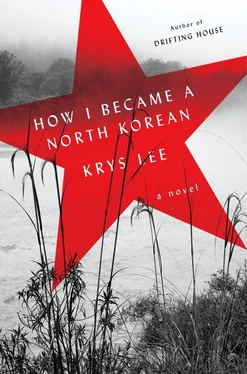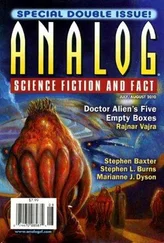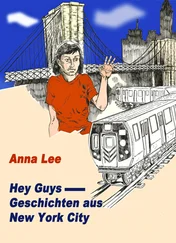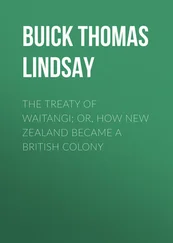He stood up. “I’m just a journalist, not a diplomat.”
Jangmi let go of me and gripped his ankle.
“Help me get out,” she whispered. “I’m begging. You have the power.”
He shielded his eyes. “You need to stop this.”
“If you help me, you can take as many photos as you want and I’ll tell you everything you would ever want to know.” Her fingers turned white as she strengthened her grip. “Things you can’t even imagine.”
He looked awkward and afraid. “Missionary Kwon knows best what to do.”
The light and speed went out of her. “He’ll keep us as long as he can. Kids? A woman, a boy from Pyongyang? We’re his prizes.”
“She’s right,” I said. “But you’re different from them — the Christians.”
Matthew shook his head vigorously. “Believe me, there are many different kinds of Christians.”
Jangmi said, “We didn’t risk our lives just to end up in this jail. There’s no one in this room who crossed without thinking they could die. You must be able to help us — you know people.”
“I don’t, it’s not like you think.” He pried her fingers from his ankle and backed away. “I trust Missionary Kwon knows what he’s doing. Give him time.”
• • •
That night, I dreamed that people were after me. I was wading through the river again, half-naked and shivering in its glassy chill. I was in Pyongyang watching a Hollywood movie with a friend: I was Leonardo DiCaprio, I was Tom Cruise. Now I was sleeping on cold, marbled rock. Pine needles jabbed into my back.
I woke up and a cool hand brushed across my sweaty forehead. A familiar voice said, Wake up, my son. It was my eomeoni, so I followed her. We journeyed in reverse across the river and the barren mountains of our country, and back to our home in Pyongyang. The house invited and repelled, opened and closed. It opened again, and we were inside, gazing at another family’s belongings: old-fashioned celadon vases showcased in the hall, a set of painted ceramic dolls, the portraits of our leaders dusted and prominently displayed in gold frames. No one was back from work or school and still the house echoed with bright, new voices. I felt betrayed.
“And look here,” Eomeoni said, and we were suddenly outside a mansion barricaded by gate upon gate. Tanks surrounded the perimeter, their great noses pivoting toward us until we were past the first gold-plated gate, past a golf course and ponds, a riding stable and a verdant forest with families of deer, then finally inside, under the light of a heavy chandelier.
“Look.” Eomeoni withdrew a gun from her sable coat. “Here is where your father died.”
I wasn’t ready to die yet, so I left her and walked out.
I was walking in the dream in which I had awakened from a dream, and then I was only walking. I found myself in the common room, in its great white silence. The full moon seemed to step on my foot’s shadow. Twice I whirled around, but there was no one there, just the sensation of breath, the weight of heavy steps that seemed to pursue me.
I went to check on Jangmi, hesitating before looking in. Blankets were pushed into a corner in the shape of a body. The moonlight caught silver cobwebs tangled across the corners of the walls, dust rustled across the room, and there was Jangmi. Jangmi, on the ledge of the window whose plastic sheath she had sliced open with the kitchen scissors, her plastered leg already swung over the ledge, and the other tucked up to her chest, as she breathed in the night air. Her hair flamed blue in the moonlight. She looked peaceful, almost — happy. But her breath came in raspy huffs, as if someone were choking her. She swung the other leg over.
I stepped slowly across the gritty floor, dizzy, the room devouring me. She was so close — if only I could convince her to wait out the masquerade of the days and months until we were finally free to make the dangerous journey to a safe third country. Then one of her legs settled on the other side of the sill; for her there must have only been the reality of the ledge.
There was a hot hiss of liquid, and a musky smell rose from her. I caught a glimpse of her wet, trembling leg. She was afraid, of course she was afraid to jump. If I made a mistake, one more life would be lost.
“ Dongmu. ” I kept my voice a gentle harmony even as my heart thundered in my ears. “Take my hand. You’ve gotten this far.”
“You don’t know what’s happened to me. You’re a man… you can’t know…”
I thought of my eomeoni, my dongsaeng, and it hurt to breathe.
“It’s two floors up. You’ll be badly hurt, and you won’t get what you want.”
She made small, shuddering animal pants. The shadows of trees danced across the walls and the wind breathed out, breathed in. Her foot, hands, and lips, her whole body was soaked blue with moonlight. A breeze gusted in, stilled.
“ Dongmu, trust me.”
“Trust is what dead people do.” She sucked on a strand of hair caught on her lip. “I want to decide when I die.”
“You’ll make it out of here, I promise.” Slowly, I stepped closer. “We’ll make a way.”
In that room where time had slowed down, I finally took her by the waist and pulled her trembling body in.
“Just a little more, you’re almost there. China’s the worst part — everyone says that. We will get out,” I said. “We will.”
Voices whirled outside my room, making shapes that I couldn’t understand. The tin sheet of roof rattled with rain. I thought of calling out, suddenly scared of what I might do alone. I didn’t trust myself anymore. I gazed at the torn window covering, the great gap into the rest of the world, and I tried to believe that the future still meant something.
This was what I believed: Men are animals. Everybody wants something from one another. Everything is an exchange.
I asked myself: What does Yongju want from me? The missionaries continued to talk. I tried and failed to sleep. Their sounds continued from down the hall as I felt my limbs, my hair against my shoulders. I was all there. My leg smelled of dried urine and my face was tight with dried tears. I disappointed myself. I expected to be stronger than this, for hadn’t I given up my world for another?
I heard Missionary Lee say, “Yongju’s right. This isn’t working. If he hadn’t seen her — we almost lost her.”
“Who decides what’s going to work or not? It takes time.”
“The journalist was… a mistake.”
Their voices continued to drift in. Beside me was a basin of water and a cloth. Yongju had left it for me, and the thought made me feel like a dried-up apple. He had seen me so compromised. I washed my face, then scrubbed down my leg, though someone had already cleaned me up.
Missionary Kwon said, “We’re giving them an incredible chance to walk hand in hand in a new life with God. You think the streets are better for them?”
I was so tired. Missionary Lee’s voice dropped.
“You don’t think I care?” Missionary Kwon asked. “I used to guide them, dodging police, slave traders, border guards. And you’re telling me that we should send them all south right away because one girl tried to jump?”
“You’ve devoted your life to helping them,” Missionary Lee said. There was some mumbling, then, “We almost lost her.”
“What about their religious education? Saving their souls? You know the conversion rates drop steeply once they leave China.” There was pacing. “And who will sponsor us if we bring them in for a week or two, then let them go? Which church organization is stupid enough to do that? It’s safety or nothing!”
“God will provide,” said Missionary Lee. “There are good people everywhere, but good is too simple a word to describe God. Maybe the more important question to ask ourselves is, Am I living a good life? A worthy life? We should be asking ourselves this right now.”
Читать дальше












